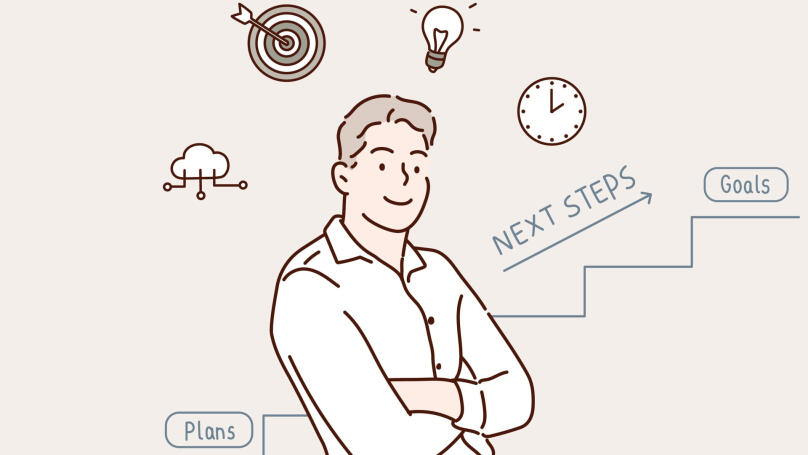Time of Miracles: Ten Traditional Questions to Ask Yourself Right Now!
Self-reflection is a person's ability to delve into themselves and their psyche to find solutions to their problems and difficult situations autonomously.

It is a highly complex and tremendous skill that significantly helps in life. You can reflect on a cornucopia of topics, including your career and personal life. I recommend a list of questions for those who have never done it - you ask yourself and answer them. It is a universal practice, including for those who are always in a hurry and don't have time just to sit down and think about themselves but who want to broaden their horizons and understand where to go.
Personally, I prefer to ask myself these questions shortly before the New Year, when I want to summarise the results and build a future route. In short, now is the time for this, so find a quiet corner, take a sheet with a pen (not necessary, but it is easier for someone to write out thoughts than to say them), and get started! Indeed, with all the answers in hand, you'll be surprised at how clear and concise your future career and personal development path will become.
1. "What is My Current Goal?"
Simply put, where are you currently aiming? If this question (there's a reason it comes first) has already caused you difficulty, that's a red flag. Perhaps you are building your career on a whim. That is, wherever you take you, you will find yourself there. It is fraught with the fact that you can take you to a professional dead end because a career is like a pyramid. It is also formed from the very bottom, brick by brick. How long do you think such a pyramid will last if you randomly shove stones?
So, ideally, you should answer this question at once. If you still cannot - no problem. Just keep asking yourself: what does your desired destination look like? Where would you like to find yourself sooner or later in your career? Try to get specific. Maybe you want a position as your boss? Or a higher salary? By how many percent? Or would you like to change jobs? In that case, what should it be? List its characteristics and describe it.
2. "Right Now, What Am I doing to achieve This goal?"
This question is necessary so that your movement towards the abovementioned goal does not become a typical "I'll start on Monday!" or "Well, I'll celebrate the New Year, and then...". Yes, this list of questions is ideal for practicing during the holidays, but that doesn't mean you should limit yourself to theory. Answer honestly. How far have you come toward your goal since you last thought about it? Where are you now? Have you made a real effort to reach it? If so, what kind?
Identify the steps you need to take to reach your "point." At first, you can write out the steps globally, like "get a second education," but then break them down into smaller sub-steps. For example, "apply to university" or "find the right online courses." Ensure you set deadlines for completing each one and start moving a bit at a time. You can make the steps even smaller so that each one takes no more than fifteen to thirty minutes to complete. Just one small action a day - but keep moving forward!
If you already have some results in the process of moving towards your goal, be sure to measure them. It is best to count them in money or percentages (e.g., revenue, increase in your KPIs, etc.). It will come in handy for understanding whether you are making the right efforts (after all, if there are no measurable results, why are you doing all this?) and for some of the following points.
3. "Who Can Help Me?"

You can't jump above your head, as they say. You usually need someone to hang down and pull you up behind them. After all, it's hard to climb Mount Everest alone. Your career growth will be much faster if you have someone more experienced and knowledgeable around you who can guide and teach you what you lack. Such people are called "mentors.". Many of them provide their services for a fee. Still, they become almost personal business coaches who not only share their valuable professional experience but can also give assignments training, select strategies, and make plans. However, you can also find a mentor among your colleagues, for example, someone who doesn't mind playing mentor and telling you a few secrets. It is imperative if you are entering a niche or profession that is fundamentally new to you - you cannot prepare for all the surprises and disadvantages on your own.
I'll reveal one life hack: even people who don't know you exist or are long dead can help you. It sounds a little creepy, but I'm talking about various celebrities and past leaders. There's probably someone who has already conquered your niche before you or whose character you admire. Study the route, skills, and characteristics of these people. You can learn from anyone. The key is to find suitable sources.
But first, at least make a list of names - both natural and familiar to you people, and those "ideals." Then, choose the most optimal and convenient one specifically for your goal!
4. "What Can My Present Employer Offer Me?"
From my experience, I've noticed that many people sometimes don't even realize what opportunities their company can offer them. For example, I had a case when an employee I was about to assign to a vital and lucrative project came to me with a resignation letter. When the employee found out about it, he took it back immediately. It was a good lesson for both of us: since then, I have always talked about what the employee can expect from his career in such and such a timeframe, and employees now come up and ask what they need to do to get a promotion, for example, or what project they can take on.
Larger companies tend to have an HR system with talent pools when employees get assigned their career development plan, such as "This one is the first in line for a management position in two years..." and so on. However, this doesn't mean that such opportunities don't exist in small companies or startups; you need to approach your manager and develop your career plan together. You do this on the principle: "If the mountain does not go to Mohammed, Mohammed goes to the mountain.". Perhaps your destination is closer than it seems, or your supervisor will tell you the shortest route. The ability to speak is the best thing that nature has invented for man! Use it to your advantage.
5. "What Opportunities Are Labour Marking Offering Me Right Now?"
Even if you are delighted with your job and prospects at your current place, it is not unreasonable to look at the market situation now. It will help you form a more accurate picture of your actual capabilities and professional needs. For example, you may accidentally find out that you have a good chance of getting even more than you planned, given how much people with your experience and skills are valued. Or you may be lucky enough to find a company with more attractive working conditions and a higher salary, which will motivate you. In general, regular market research is a must-have if you want to make your career development systematic and systematic.
6. "Under What Conditions am I Most Productive and Happy?"

Answering this question will help you identify the most effective ways to restore your energy and inner resources and perhaps even adjust your career. It is equally helpful for optimizing your professional performance as it is for optimizing your personal life. Let me explain.
Some people feel much more productive if they wake up with the lark and start the morning with a delicious and beautiful breakfast. For some people, the peak of creativity and efficiency falls on business trips and traveling. When you are on the move, you have little time but can perform tasks quickly and always " hit the bull's-eye." Some people are comfortable with clear instructions and a quiet workplace away from people, while others work and think best in a crowded café. It's the same with relaxation: some people recover their resources fastest if they go hiking, and some if they sit at home with a book wrapped in a plaid. Think about the atmosphere, the things at hand, the smell, the feel, and the surroundings you must be in.
It is vital to identify two types of suitable conditions for yourself at once: the conditions in which you are most productive (and which are therefore best suited to organizing your work) and the conditions in which you are happy and feel energized (and which you need to create for yourself to prevent emotional burnout and stress). Furthermore, you must erase these conditions in yourself and figure out how to make them happen and then alternate between them regularly. It is the best way to prevent personal crises and achieve career goals quickly, which I discovered for myself.
7. "Does Fear of Change and Uncertainty Stop Me?"
Think about this broadly: is there a single idea, dream, or goal you're putting off just because you're afraid of it? It may not only be an unloved job that makes you nervous just because you must look for a new one but also, for example, an outdated romantic relationship, moving to another country, changing your image, or simply buying a new piece of technology that you want but can't decide to replace. Fear of change is the most prevalent fear of modern people, and I can understand it. Our lives are stressful enough that we don't want to leave our comfort zone, but that's how we miss out on invaluable time and opportunities and waste our resources.
Identify the risks and threats that make you hesitate with this or that decision. Figure out how to turn those threats into exciting challenges and protect yourself from losses. In cognitive psychotherapy, there is a technique of three scenarios: you write the worst possible turn of events that could happen, then the most optimistic and fabulous, and then the one in between. It will be the most realistic and likely. It helps you look at things soberly and reduce anxiety to initiate change finally.
8. "How do I respond to Mistakes and Failures?"
We all have failures occasionally that can throw us off track - and that's okay. The key is to get back up afterward and become more robust, which depends solely on how you perceive failure. Believe me, it's enough to change that perception to change your whole life.
For me in my school years, it was a stigma, something that inevitably made me think: "I'm terrible and worthless," "Why didn't I do it?", "Others could have done it". However, when I got my first job as a student, I realized that this approach was a deliberate failure. It not only doesn't help to survive failures but also takes away the resources that otherwise could be spent on correcting mistakes and benefiting from the situation. Moreover, you can always benefit - at least learn how not to do things so you don't repeat the same error. So, the right questions to ask yourself when you make a mistake are: "How can I do better next time?" "Where can the information I got be useful?" and "What are the benefits even in this joint?"
9. "Who am I Socialising With? Do I need these People?"

The people around us either contribute to our development or inhibit it. Imagine if you are among people every day who complain about their lives but do nothing to change them. How would you feel? How likely are you to remain motivated to break out of the vicious cycle, unlike them, and make a difference? Now, imagine that all your friends are successful careerists or athletes who care for their health, regularly attend educational courses, travel, and launch projects and startups. Most likely, you will quickly want to become like that because we are all subject to other people's influence to a greater or lesser extent. So let this influence be positive!
"Cleaning" your environment is helpful, especially at the end of each year. Don't forget to cleanse it off those who make you feel insecure or make fun of you for your global goals! Find the company of like-minded people, at least those who are also looking forward instead of looking back. A year from now, just be sure to ask yourself this question again and do the purge again: changing your environment is part of development. It may be outdated by next year and needs another update so you don't get "stuck."
10. "How Long Has It Been Since I Tried Something New?"
Sometimes, we forget how different and unique life can be, yet this is the most reliable source of inspiration, ideas, and inner energy! The pursuit of stability often leads to the fact that we imprison ourselves, afraid to shake it once again. Moreover, the human brain is sluggish and capricious: if we monotonously do the same work every day and live the same week after week, the brain eventually begins to bog down on new tasks. Rebel on top of that, releasing stress hormones and leading to anxiety or even depression to let us know - it needs fresh air and contemporary spaces.
Try spending your next weekend in a way you haven't before. For instance, sign up for a pottery or oil painting class, go to a new sauna or massage, rent a country house, or attend a food festival in the city center. Change your surroundings and forms of leisure and see how your body and brain react to them. Don't give up immediately if your body reacts to stress - it's a habit! Also, give yourself a choice: if swimming doesn't work, how about horse riding? I suggest you watch the film Always Say Yes starring Jim Carrey. - It's a manual on how to shake things up!
Training, by the way, is also something to think about while you're answering this question. Level up essential skills for your career and today's job market promptly. If you haven't attended any courses or upgraded your skills in a year, it's time to do it! If anything, Lectera and its super-fast intensive training are always there for you.
Share this with your friends via:
Latest News

In the UK, £23 million has been allocated for the expansion of the EdTech Testbed program — pilots of educational technologies in schools and colleges.

In the US, Tuskegee University announced the launch of Tuskegee University Global Campus (TUGC) — a new online platform for distance learning.

A significant stage in the development of the alternative education system has begun in West Northamptonshire in the UK: the County Council is actively calling on parents, guardians, and trustees to participate in shaping the future of this key area.

Outwoods Primary School in Atherstone, Warwickshire, having experienced deep sadness after the loss of their famous cat, Silla, has found solace in a new pet – a Maine Coon named Aloysius O’Hara.

In modern universities, artificial intelligence, and in particular ChatGPT, is rapidly transforming from a controversial tool into a full-fledged student assistant.












 £23 million allocated for the expansion of EdTech Testbed in the UK
£23 million allocated for the expansion of EdTech Testbed in the UK
 Tuskegee University launches Global Campus — a new online platform
Tuskegee University launches Global Campus — a new online platform
 Test: How Psychologically Mature Are You? Check Your Inner Foundation.
Test: How Psychologically Mature Are You? Check Your Inner Foundation.
 Test. Check Your Social Media Dependency Level!
Test. Check Your Social Media Dependency Level!
 Test: What Business is Right For You?
Test: What Business is Right For You?
 Test: How Prone Are You to Abusive Behavior as a Manager?
Test: How Prone Are You to Abusive Behavior as a Manager?
